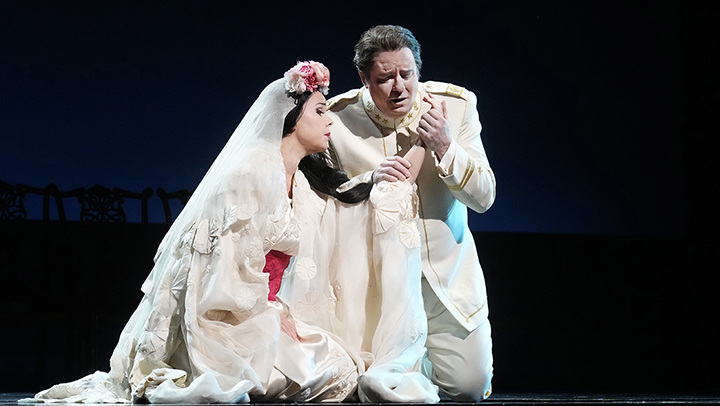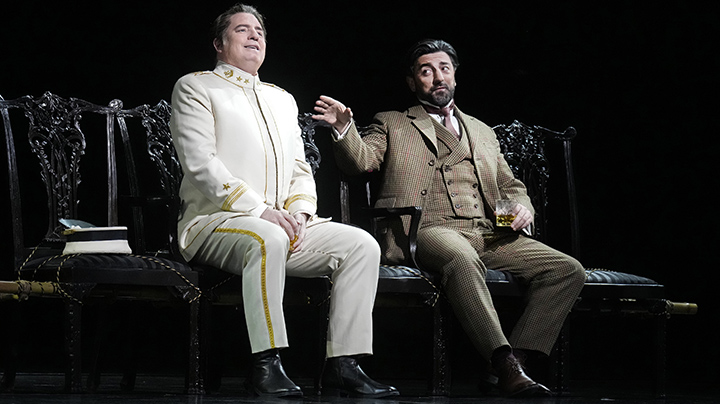
In a so-far dispiriting season, the Met has cast this revival unusually strongly – Eleonora Buratto and Asmik Grigorian take on the titular heroine later in the run. Typically considered a spinto role, Cio-Cio San has nevertheless been effectively performed by lighter voices who perhaps better capture the innocence of the teenage geisha. It’s been fascinating to chart Kurzak’s vocal development, best exemplified in last season’s double-header as a worldly, voluptuous Adina and in a cleverly managed, surprisingly chesty Tosca. She’s taken on heavier repertoire in European houses, from Elisabetta di Valois to Santuzza, but Butterfly seems to be the ideal fit for her current vocal estate.
Her soprano retains its silvery sheen, and she’s hugely effective in the first act where she truly sounds and looks fifteen without slipping into coyness. Yes, she takes the D-flat and floats it marvelously, but the real highlight is the long, unbroken lines of “Vogliatemi bene” which Kurzak sings with radiant tone and touching simplicity. As the opera progresses, she darkens her sound and increases her use of chest voice – her “Ah! m’ha scordata” comes as a genuine shock – and the aching plangency she achieves in “Che tua madre” and in the final scene are dramatically effective. It’s not a big sound and one wants more heft to the sound in the climax of “Un bel di,” but her sound cuts through the orchestration well and she makes canny musical choices.
I’ve never heard anyone take the climactic high A in the final scene subito piano before, but it’s dramatically extremely effective and a clever choice for a lighter voice in the role. I was also impressed by the specificity of her text and the care she took in evolving the quality of her parlando passages, from the girlish innocence of the opening act to the shock and tragedy of the finale. Vocally, it’s a hugely risky performance and there were moments in the second act that I worried that she’d never make it through the evening, but the emotional payoff is immense.
She was supported by an unusually thoughtful cast. Matthew Polenzani may not be the verismo tenor of anyone’s dreams, but he’s a stylish singer and ideally matched with Kurzak’s lyricism. He was at his best in the love duet, with sensitive phrasing and elegant tone, but lacked the brash spontaneity for “Addio fiorito asil.” Dramatically, it’s effective to have an older Pinkerton to highlight just how young Butterfly is, but it also makes the character even less sympathetic when you can’t use the excuse of youthful recklessness.
Elizabeth DeShong, criminally underused by the Met, brought a plummy, rich mezzo to Suzuki, lightening her voice to blend with Kurzak’s in a ravishing flower duet, and a nuanced dramatic presence. She was genuinely funny in her interactions with Tony Stevenson’s Goro, bringing some much-needed levity to the evening. Davide Luciano was a sympathetic Sharpless, with velvety smooth tone and native diction. Jeongcheol Cha stood out as Yamadori, with a rich, resonant bass-baritone and commanding presence.
But the standout performance of the evening came from conductor Xian Zhang, making her Met debut. Zhang has a fantastic ear for balance, never allowing the orchestra to overwhelm the singers, but nevertheless produces a rich palette of orchestral color, particularly from the percussion section. There’s a huge amount of detail and refinement to Zhang’s conducting, and she nicely captures the ebb and flow of the score. Some moments are slow for my taste – the end of the love duet wasn’t as combustible as I would have wanted – but it was an auspicious debut and she’s a very welcome addition to the Met’s roster.
Photos: Ken Howard



























Comments